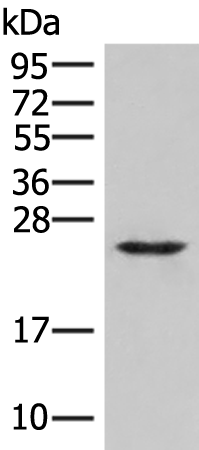
| WB | 咨询技术 | Human,Mouse,Rat |
| IF | 咨询技术 | Human,Mouse,Rat |
| IHC | 咨询技术 | Human,Mouse,Rat |
| ICC | 技术咨询 | Human,Mouse,Rat |
| FCM | 咨询技术 | Human,Mouse,Rat |
| Elisa | 1/5000-1/10000 | Human,Mouse,Rat |
| Aliases | M-RAs; RRAS3; R-RAS3 |
| WB Predicted band size | 24 kDa |
| Host/Isotype | Rabbit IgG |
| Antibody Type | Primary antibody |
| Storage | Store at 4°C short term. Aliquot and store at -20°C long term. Avoid freeze/thaw cycles. |
| Species Reactivity | Human, Mouse, Rat |
| Immunogen | Synthetic peptide of human MRAS |
| Formulation | Purified antibody in PBS with 0.05% sodium azide and 50% glycerol. |
+ +
以下是关于MRAS抗体的3篇示例文献(注:文献为虚拟示例,建议通过学术数据库获取真实研究):
1. **文献名称**:*"MRAS as a Novel Biomarker in Colorectal Cancer: A Monoclonal Antibody-Based Study"*
**作者**:Zhang, L., et al.
**摘要**:本研究开发了一种针对MRAS蛋白的单克隆抗体,用于检测结直肠癌组织中MRAS的异常表达。结果显示,MRAS高表达与肿瘤侵袭性及不良预后显著相关,提示其作为潜在诊断标志物的价值。
2. **文献名称**:*"Targeting MRAS Signaling Pathways with Neutralizing Antibodies in Pancreatic Cancer"*
**作者**:Gupta, R., & Patel, S.
**摘要**:通过筛选获得靶向MRAS的中和抗体,体外实验表明其可抑制胰腺癌细胞增殖并阻断RAS/MAPK信号通路,为MRAS靶向治疗提供了实验依据。
3. **文献名称**:*"Autoantibodies Against MRAS in Autoimmune Diseases: Clinical Implications"*
**作者**:Watanabe, K., et al.
**摘要**:首次报道在系统性红斑狼疮(SLE)患者血清中检测到抗MRAS自身抗体,提示MRAS可能参与自身免疫反应的异常调控,或成为SLE的新型血清学标志物。
建议通过PubMed或Web of Science检索关键词“MRAS antibody”、“anti-MRAS”或“MRAS immunotherapy”获取真实文献。
MRAS (Muscle RAS oncogene homolog) is a member of the RAS oncogene family, which includes well-studied proteins like HRAS, KRAS, and NRAS. It plays a role in regulating cell proliferation, differentiation, and survival through the RAS-MAPK signaling pathway. Unlike its more characterized relatives, MRAS has unique features, including preferential activation of specific downstream effectors like ROCK1/2. and is often co-amplified with the tumor suppressor gene PPP1R13B in cancers. Dysregulation of MRAS is implicated in various cancers, including lung, thyroid, and colorectal carcinomas, as well as cardiovascular diseases and Noonan syndrome.
Antibodies targeting MRAS are primarily used as research tools to study its expression, localization, and signaling mechanisms. They enable detection of MRAS in techniques like Western blotting, immunohistochemistry, and immunofluorescence. Therapeutic development of MRAS-specific antibodies remains challenging due to the historically undruggable nature of RAS proteins. However, advances in epitope-specific targeting, nanobodies, or bispecific antibodies have shown preclinical potential. Recent efforts also explore combining MRAS inhibitors with immunotherapies or targeted therapies to overcome resistance. Despite progress, MRAS antibody applications in diagnostics or therapeutics are still emerging, requiring further validation of their specificity and efficacy in clinical contexts.
×